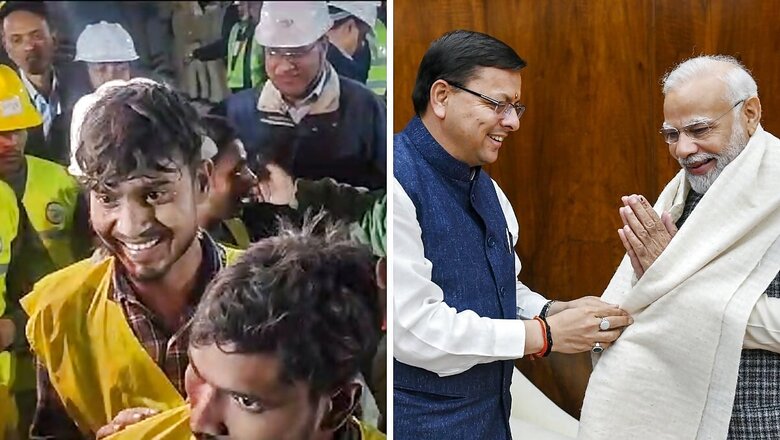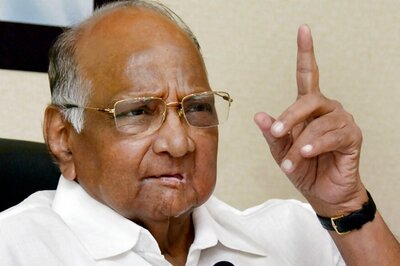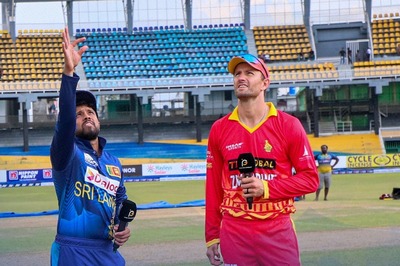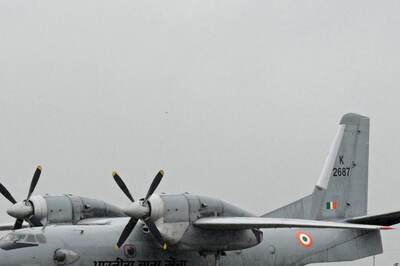
views
When the Silkyara tunnel rescue efforts hit a big roadblock last week as the auger machine broke down, the resolve of the Centre to get the 41 workers out safely became like a top-level mission. Prime Minister Narendra Modi decided to send in three top-level functionaries of the government to camp at the tunnel site and personally monitor and oversee the renewed rescue efforts in Uttarkashi.
The Principal Secretary to the PM, PK Mishra, who is the country’s foremost disaster management expert, former Army Chief and now Union Minister VK Singh, who has handled such crises in the past, and Union Home Secretary Ajay Bhalla, who had been playing a key role in coordinating rescue efforts, all of them reached the Silkyara tunnel to give some vital tips to the rescuers and monitor the effort.
PM Modi was in constant touch with them as well as the Chief Minister of Uttarakhand, Pushkar Dhami, over the progress. Finally, after 17 days, the 41 labourers were rescued on Tuesday night.
This was just another example of how the Modi government responds to a crisis and shows exceptional strategic thinking and empathy in the process, senior officials in the government told News18.
The message was simple – every Indian’s life matters.
उत्तरकाशी में हमारे श्रमिक भाइयों के रेस्क्यू ऑपरेशन की सफलता हर किसी को भावुक कर देने वाली है। टनल में जो साथी फंसे हुए थे, उनसे मैं कहना चाहता हूं कि आपका साहस और धैर्य हर किसी को प्रेरित कर रहा है। मैं आप सभी की कुशलता और उत्तम स्वास्थ्य की कामना करता हूं।
यह अत्यंत…
— Narendra Modi (@narendramodi) November 28, 2023
MISSION MODE: OVER 17-PLUS AGENCIES AT WORK
In the Silkyara tunnel rescue, right from the National Disaster Response Force (NDRF) of the Centre to state rescue agencies, international drilling experts and local rat-mining labourers, whom most had forgotten about, all played a key role. It was yet another example of how during any crisis or calamity, the “whole of the government gets into a mission mode", doing all that is possible to ensure a “coordinated and mission-focused strategy", a top official said.
Modi was in direct touch with all stakeholders at multiple levels even during his travel and busy schedule. A key decision was a landline facility set up by BSNL with a handset given to the workers trapped inside the partially collapsed tunnel for communication.
“The entire Uttarakhand episode demonstrates yet again that when it comes to PM Modi, he will leave no stone unturned to ensure the safety of any Indian, whether that Indian is stuck in a tunnel inside a mountain or an Indians trapped abroad on foreign soil in Ukraine or Afghanistan," BJP spokesperson Shehzaad Poonawalla told News18. He said 17-plus agencies including the Prime Minister’s Office (PMO), Chief Minister’s Office (CMO), Indian Air Force (IAF), NDRF, Border Roads Organisation (BRO), Oil and Natural Gas Corporation (ONGC), State Disaster Response Force (SDRF), National Disaster Management Authority (NDMA) and State Disaster Management Authority (SDMA) and the Ministry of Road Transport and Highways among others were employed in Uttarkashi. “Manush, machine aur Mahadev, all three were invoked," Poonawalla told News18.
"Your courage and patience has inspired everyone": PM Modi's message to workers who've been rescued from collapsed #Uttarakhand tunnel. "I salute the spirit of all involved in rescue efforts, he adds News18's @AmanKayamHai_ shares his inputs @Zakka_Jacob |… pic.twitter.com/DaguYNF5Xq
— News18 (@CNNnews18) November 28, 2023
KEY FACTORS THAT WORK
Senior officials said that a hallmark of the government is to work in mission mode during the time of crisis and mobilizing all available resources and departments to work together towards a common goal. “This approach ensures that the government’s response is swift, efficient, and effective," the official said. The PM’s direct and personal involvement in such crisis management helps immensely, the official said. “He is in regular touch with stakeholders and often sends his trusted ministers on the ground. The involvement of top ministers is directly on the ground. This hands-on approach helps in better coordination and quicker decision-making," the official further explained.
The Modi government seems to have learnt lessons from the missteps in earlier regimes during the 26/11 attacks when lack of coordination between the government was exposed due to delayed responses and security breaches such as the live telecast of operation details. The National Security Guard (NSG) arrival in Mumbai was delayed during the 26/11 attacks and live TV coverage aided Pakistani handlers across the border to alert the terrorists in the Taj hotel.
Uttarakhand CM Pushkar Singh Dhami tweets, "PM Narendra Modi called up once again today and sought details about the rescue and relief operation ongoing at the under-construction tunnel at Silkyara, Uttarkashi…" pic.twitter.com/j4QLrkQO3v— ANI (@ANI) November 21, 2023
EARLIER CRISES: FROM UKRAINE TO SUDAN TO ODISHA
During the Odisha train disaster, one saw how Prime Minister Narendra Modi flew down to assess the situation at the crash site and meet the injured and their families, while Railway Minister Ashwini Vaishnaw coordinated the response and stayed at the site till it was cleared. NDRF teams were actively engaged in the rescue operation too.
#WATCH | Prime Minister Narendra Modi interacted with members of the Hakki Pikki tribe, who were evacuated from Sudan under #OperationKaveri, in Shivamogga earlier today#Karnataka pic.twitter.com/SW8EOuLFTT— ANI (@ANI) May 7, 2023
During the Sudan crisis, India launched Operation Kaveri to address the situation of 3,000 Indians stuck in Sudan during clashes between the army and paramilitary forces. The PM chaired high-level meetings to direct officials to devise a contingency plan for their safe evacuation and Foreign Minister S. Jaishankar engaged with Saudi Arabia and UAE to facilitate the evacuation of Indians.
The IAF operated 17 flights and Navy executed five sorties to evacuate nearly 3,900 Indians. Union Minister of State for External Affairs, V. Muraleedharan, was deputed on the ground in Saudi Arabia to oversee these operations.
A similar approach was seen in ‘Operation Ganga’ to help evacuate 22,500 Indians from Ukraine during the war, including Indians stranded in Romania, Hungary, Poland, and Slovakia.
The PM deputed four Union Ministers to different locations to assist in the evacuation — Jyotiraditya Scindia to Romania and Moldova, Kiren Rijiju to the Slovakia border, Hardeep Singh Puri to the Hungary border, and former General VK Singh to Poland. These ministers facilitated safe passage and smooth evacuation of Indian nationals.
India’s handling of the Covid pandemic, from a swiftly implemented nationwide lockdown and fast approvals for indigenous vaccines also highlighted a similar approach.



















Comments
0 comment